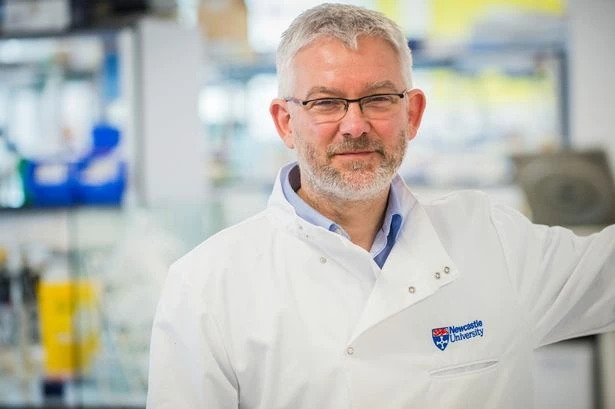
Partner Article
Researchers in North East at forefront of personalised medicine development
Some of the region’s brightest minds have moved to further establish the North East as a ‘leading-light’ in childhood cancer research.
Personalised medicine tailored to the biological characteristics of each individual patient’s disease has become a key focus for researchers at the £5.5million Wolfson Childhood Cancer Research Centre which brings together world-renowned experts from Newcastle University and Newcastle upon Tyne Hospitals NHS Foundation Trust.
In the 18 months that the centre has been open, researchers have secured a further £5million in grants to continue world-class childhood cancer research.
The funding will enable the progression of the pivotal work taking place to define our understanding of how to tackle cancers such as Leukaemia and Medulloblastoma along with the development of personalised medicine.
Childhood cancer has been one of the success stories of modern medicine. Such have been the scientific advances made over the past 30 years that eight out of 10 children diagnosed today will be cured.
However, cancer in children and young people still remains a serious challenge. Around 1,600 new cases of childhood cancer are diagnosed each year in the UK and, despite all the progress, cancer remains the number one cause of non-accidental death in young children in the UK. Moreover, many patients that survive their disease suffer life-long side-effects resulting from their treatment.
At the Wolfson Childhood Cancer Research Centre over 90 scientists and clinicians are working to define the molecular makeup of cancer cells, explore and evaluate new cancer treatments and help deliver more personalised and less aggressive therapies to patients.
Professor of Molecular Haematology at the Wolfson Childhood Cancer Research Centre, Olaf Heidenreich, said: “Over the past year our areas of focus have included blood cancers, medulloblastoma and neuroblastoma. Our research programmes have continued to make new discoveries on the molecular basis of tumour development. We apply these discoveries to precision medicine approaches with the aim to improve survival of and reduce treatment side-effects in children with cancer.
“Most notably we have found that childhood Medulloblastoma can be separated into seven subgroups which all have their own biological and clinical characteristics. “This discovery has paved the way for the development of more personalised medicine – tailored treatments such as gentler therapies in patients predicted to have a good outcome, which could make a huge difference to the long-term health prospects of those who survive treatment.”
Newly appointed Director for the Northern Institute for Cancer Research (NICR), Steve Clifford, leads the childhood brain tumour research programme in Newcastle, with a focus on medulloblastoma.
Steve said: “Work at the Wolfson Childhood Cancer Research Centre focuses on developing less toxic therapies with fewer side-effects, and more effective treatment options for youngsters with advanced cancer and those whose illness has returned.
“The centre is one of the largest in all of Europe, and has laboratory space for over 100 doctors and scientists dedicated to childhood cancer research, office accommodation for 12 senior researchers, collaborative research areas, and specialist facilities for tissue culture, cell sorting, bacteriology and microscopy.
“However, in order to make this vital research possible, facilities like these rely a great deal on the generosity of the public who support charities like the North of England Children’s Cancer Research (NECCR).”
Chairman of NECCR, Chris Peacock, said: “Despite the huge advances to the treatment of childhood cancers that we’ve experienced, we still lack efficient therapies for some children who present with advanced stage disease or for those whose cancer has come back.
“Recent grants won by the Wolfson Childhood Cancer Research Centre play testament to the fantastic, pioneering research taking place in the North East – but we know we can’t rest on our laurels until we have conquered this disease and that’s why charities such as NECCR are so important.”
The Wolfson Childhood Cancer research centre was made possible by the Future Fund – a collaborative initiative between Newcastle University, the Great North Children’s Hospital and NECCR. The aim of this fund was to raise £5.5 million to create a state-of-the-art new centre for research into childhood cancer.
For more information about NECCR, visit: https://www.neccr.org.uk/
This was posted in Bdaily's Members' News section by Jeremy Mountain .
Enjoy the read? Get Bdaily delivered.
Sign up to receive our daily bulletin, sent to your inbox, for free.








 Raising the bar to boost North East growth
Raising the bar to boost North East growth
 Navigating the messy middle of business growth
Navigating the messy middle of business growth
 We must make it easier to hire young people
We must make it easier to hire young people
 Why community-based care is key to NHS' future
Why community-based care is key to NHS' future
 Culture, confidence and creativity in the North East
Culture, confidence and creativity in the North East
 Putting in the groundwork to boost skills
Putting in the groundwork to boost skills
 £100,000 milestone drives forward STEM work
£100,000 milestone drives forward STEM work
 Restoring confidence for the economic road ahead
Restoring confidence for the economic road ahead
 Ready to scale? Buy-and-build offers opportunity
Ready to scale? Buy-and-build offers opportunity
 When will our regional economy grow?
When will our regional economy grow?
 Creating a thriving North East construction sector
Creating a thriving North East construction sector
 Why investors are still backing the North East
Why investors are still backing the North East